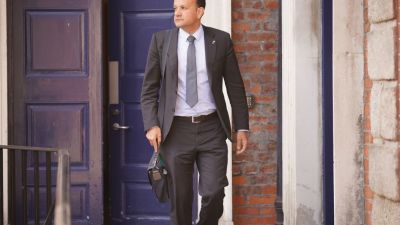Irish government warns of tough years to come due to rising cost of living and inflation

Ireland's Tanaiste has warned that the rise in inflation and the cost of living crisis will impact the country for years to come.
Leo Varadkar said the rising costs of everyday life are the product of an international crisis that cannot be solely blamed on the economic effects of Russia's Ukraine invasion.
Mr Varadkar said that, while the government can respond to the price rises, it cannot bring in new measures to offset a particular price increase every few weeks.
He also warned that the increase in cost of living and inflation - which is forecast to rise to 8.5% in the coming months - is not going to be temporary.
"There are lots of reasons that's not just Ukraine," Mr Varadkar said on Tuesday.
"There are lots of reasons as to why we're seeing inflation roar across the world at the moment and lots of reasons why we're seeing the cost of living rise.
"That's to do with monetary policy, it has to do with the pandemic and supply chains, it is to do with the war in Ukraine as well.
"While we do need to respond to the symptoms, which is price rises, that's not the solution. "I don't think we can come back every few weeks, with a new measure to offset a particular price increase.
"We need to see this for what it is, which is an international crisis, an increase in inflation that's going to be with us for years more so than months."
Taoiseach Micheal Martin said the war is having "very significant repercussions" on the global economy.
He said the country needs to take an "inclusive approach" as to how it responds to the crisis. Mr Martin also said that the EU sanctions imposed against Russia has its "own systemic consequences".
"We have a situation which will manifest itself in food and food security, and other commodities have gone up very high, and all that now is feeding into the mainstream economy," Mr Martin added.
"So as a government and as a society, more importantly, we just have to stand back and assess the enormity of all of that, acknowledge the uncertainty from now to the end of the year at a minimum, and take a considered and inclusive approach to how we respond to all of this into the and the totality of this."
He said that the coalition leaders will soon meet the Minister for Finance Paschal Donohoe and Minister for Public Expenditure Michael McGrath about what measures can be brought in to address the crisis.
"From poverty rates through to budgetary policy, right through to how we respond to the immediate pressures, and how do we alleviate pressures on people," Mr Martin added.
"Parallel with that we have to deal with humanitarian crisis in respect of public expenditure increases, obviously in terms of accommodation, education, childcare, and so on."
Mr Varadkar said the Government is looking at plans to offset the cost of the planned carbon tax increases on home heating oil and other fuels, which is to come in next month.
The increases will add €1.50 euro a month to home heating oil cost and €1.40 to gas bills each month.
Mr Varadkar said the rise in carbon tax is already legislated for.
"The money is ring-fenced, it goes into the fuel allowance, it goes into green schemes for farmers, it goes into funding our retrofit programme," he added.
"But it will have an impact on people, and we're very much aware of that as a government.
"Thirty euros might not sound like a lot of money but it is a lot of money if you don't have and that of course comes on top of increases that have happened to date.
"So we are examining means as to how we might offset that, so that people are no worse off than they would be as a consequence of that increase.
"We're working on that across government at the moment."